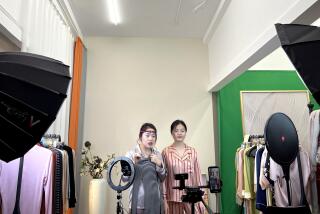FOCUS : Hong Kong Bankers Help Open Doors to China
- Share via
Avon Products has built an international cosmetics empire largely by selling its products door-to-door in the Americas and parts of Asia and Europe. However, when Avon called on China, the company made no progress until Hong Kong banker David Li began to open doors.
Avon approached Li, chief executive at Hong Kong-based Bank of East Asia, after failing for five years to interest the Chinese government in its proposal to form a joint venture with a Chinese company to produce and sell cosmetics in China.
Shortly after enlisting Li’s help, Avon won the required approvals from the Chinese government. By November, 1990, Avon had formed a joint venture with the Guangzhou Cosmetics Factory in the southern city of Canton.
Avon’s experience illustrates the influence of Hong Kong banking in Chinese economic affairs. The British colony’s institutions carry weight in Beijing because they have been investing heavily in China and encouraging Western companies to do likewise. Under a treaty with the British, Hong Kong reverts to Chinese control in 1997, but it is expected to continue to be a center of business activity.
Hoping to facilitate more American investment in China, the Bank of East Asia recently opened its first branch office in Los Angeles. Li, during a recent Los Angeles visit, talked about the role of Hong Kong banks in China’s efforts to attract investors and move toward a more market-oriented economy.
“It is through Hong Kong that investment from the United States, Europe, Japan, Taiwan and Southeast Asia usually moves . . . into China,” Li said. “Put simply, it is in Hong Kong that the deals are done, the opportunities found and packaged and the financing put together.”
Foreign trade and foreign investment are critical to the Chinese. According to some estimates, foreign trade represents 45% of China’s gross national product and foreign investment generates 15% of China’s exports. Hong Kong-based banks and industrialists directly or indirectly account for more than 60% of foreign investment in China.
Hong Kong capital has created about 2.5 million jobs, according to Baroness Lydia Dunn, a director at Hongkong and Shanghai Banking Corp., parent of HongkongBank. It also has indirectly created another 1.5 million jobs, she said.
Baroness Dunn, who recently visited Los Angeles, has asked Congress to consider Hong Kong’s stake in China when it decides in coming weeks whether to extend most-favored-nation trading status to China. That status keeps American tariffs on Chinese products as low as imports from most other American trade partners.
It has not always been easy for American firms to get a stake in China, but many who have been successful say the effort was worthwhile.
“We found it very difficult to get into China,” recalled John Cox, an Avon spokesman. “We sought David’s advice and asked him to introduce us to people in the Chinese government.”
By intervening, David Li helped the New York-based cosmetics company as well as many residents of southern China, Avon executives say.
Avon sought to enter the Chinese market because it believed that Chinese women, once encouraged to eschew makeup and Western wear in favor of boxy Mao suits, are increasingly interested in colorful fashions and cosmetics.
It appears that Avon has actually underestimated the demand. In projections made in 1990, the company said it expected its Chinese team to generate sales of about $1.5 million in 1991. It now expects sales of about $4 million by the end of this year. Avon says it has 4,000 salespeople servicing about 60,000 households per month.
To cope with the demand, Avon this month opened its second branch office--in a suburb of Canton--to distribute products to its growing sales force. The company will open a third branch office next month.
Avon, which launched its manufacturing operations with 50 workers, recently doubled that work force by adding a second shift. The factory produces 80 products; among them are fragrances, skin-care goods and other cosmetics. Eventually, Avon plans to export much of its Chinese-produced goods. The company is already exporting Chinese-made gifts and decorative items such as wicker baskets and small stuffed toys.
Although Avon once believed that start-up costs would keep the Chinese operation in the red for three years, it now says it expects to make a profit in 1992--more than a year ahead of schedule.
More to Read
Inside the business of entertainment
The Wide Shot brings you news, analysis and insights on everything from streaming wars to production — and what it all means for the future.
You may occasionally receive promotional content from the Los Angeles Times.









